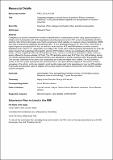Por favor, use este identificador para citar o enlazar a este item:
http://hdl.handle.net/10261/178379COMPARTIR / EXPORTAR:
 SHARE SHARE
 CORE
BASE CORE
BASE
|
|
| Visualizar otros formatos: MARC | Dublin Core | RDF | ORE | MODS | METS | DIDL | DATACITE | |

| Título: | Upgrading collagenous smooth hound by-products: Effect of hydrolysis conditions, in vitro gastrointestinal digestion and encapsulation on bioactive properties |
Autor: | Lajmi, Khouloud; Gómez Estaca, Joaquín CSIC ORCID; Hammamia, Mohamed; Martínez Álvarez, Óscar CSIC ORCID CVN | Palabras clave: | Protein Hydrolysates Prolyl endopeptidase-inhibitory activity ACE-inhibitory activity Response surface methodology Trypsin Encapsulation |
Fecha de publicación: | abr-2019 | Editor: | Elsevier | Citación: | Food Bioscience 28: 99-108 (2019) | Resumen: | Collagenous by-products derived from smooth hound (Mustelus mustelus) were studied using trypsin hydrolysis to obtain protein hydrolysates with ACE (angiotensin converting enzyme) and/or PEP (prolyl endopeptidase)-inhibitory activities. Most of the hydrolysates were mainly composed of short peptides. A response surface methodology (RSM) was used to optimize the conditions of hydrolysis (pH 7, 8 or 9, and temperatures of 35, 45 or 55ºC), which led to a higher degree of hydrolysis (DH=3.4%), as well as to an increase in ACE and PEP-inhibitory activities (maximal inhibitions of 68.1 and 81.7%, respectively). According to the model used, neither hydrolysis temperature nor pH in the ranges studied had a significant effect on DH, whereas PEP-inhibitory activity was significantly affected by both factors. pH had a significant effect on ACE-inhibitory activity. Optimum conditions of hydrolysis to obtain maximum activity differed for the two activities: 35ºC/pH 7 for PEP-inhibitory activity and 45.9ºC/pH 9 for ACE-inhibitory activity. The results suggested that these biological activities were influenced by peptide sequence rather than peptide length. This was also confirmed by the amino acid composition and molecular weight (MW) profiles. The ACE-inhibitory activity of the most potent hydrolysate was evaluated after in vitro gastrointestinal digestion. The results showed a worsening of the activity, which was related to small peptide losses and to the appearance of new low MW peptides.Hydrolysate encapsulation using an alginate-whey protein isolate microsphere improved the ACE-inhibitory activity (IC50=0.24 mg/ml). | Versión del editor: | https://doi.org/10.1016/j.fbio.2019.01.014 | URI: | http://hdl.handle.net/10261/178379 | DOI: | 10.1016/j.fbio.2019.01.014 | ISSN: | 2212-4292 |
| Aparece en las colecciones: | (ICTAN) Artículos |
Ficheros en este ítem:
| Fichero | Descripción | Tamaño | Formato | |
|---|---|---|---|---|
| FBIO_2018_451_Revision 5_V0-1.pdf | 649,87 kB | Adobe PDF |  Visualizar/Abrir |
CORE Recommender
SCOPUSTM
Citations
17
checked on 11-abr-2024
WEB OF SCIENCETM
Citations
15
checked on 13-feb-2024
Page view(s)
351
checked on 19-abr-2024
Download(s)
267
checked on 19-abr-2024
Google ScholarTM
Check
Altmetric
Altmetric
NOTA: Los ítems de Digital.CSIC están protegidos por copyright, con todos los derechos reservados, a menos que se indique lo contrario.
